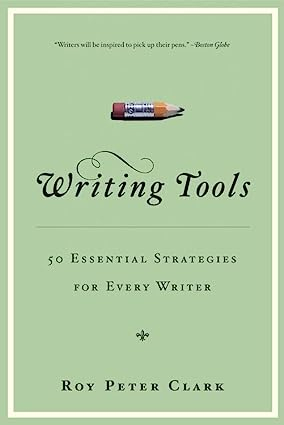 There are three things I credit for helping me grow as a writer.
There are three things I credit for helping me grow as a writer.
The first is finding a writing group to be a part of. The sound advice and encouragement I receive from the White County Creative Writers has been instrumental in my growth as a writer.
The second thing is simply to write, write, write. Continuous writing, revising my work, and especially rejection feedback have helped me refine my writing and helped me improve.
The third thing is reading books on the writing craft. There are a plethora of books you can find that cover everything from writing how to write dialogue to how to outline your novel.
One book in particular that I have gained much knowledge from is Writing Tools: 50 Essential Strategies for Every Writer by Roy Peter Clark. To me, the book works as a toolbox to assist in my writing. The strategies are very practical and I often find myself going back to the book for guidance on a writing issue I want to improve on.
You may discover that some of these strategies you are already using and so the workshop section that comes at the end of each strategy will be useful in helping to practice the craft.
![]()
The book is divided into four sections:
1. Nuts and bolts: strategies for making meaning at the word, sentence, and paragraph levels.
2. Special effects: tools of economy, clarity, originality, and persuasion
3. Blueprints: ways of organizing and building stories and reports
4. Useful habits: routines for living a life of productive writing
I have pulled something useful from nearly all fifty of the strategies. A few examples of ones that I have found especially important in helping me grow as a writer are:
#1 Begin sentences with subjects and verbs. Make meaning early, then let the weaker elements branch right.
#2 Order words for emphasis. Place strong words at the beginning and at the end.
#3 Activate your verbs. Strong verbs create action, save words, and reveal the players.
#12 Give key words their space. Do not repeat a distinctive word unless you intend a specific effect.
#15 Pay attention to names. Interesting names attract the writer — and the reader.
#16 Set the pace with sentence length. Vary sentences to influence the reader’s speed.
#26 Use dialogue as a form of action. Dialogue advances narrative.
#32 Place gold coins along the path. Reward the reader with high points, especially in the middle.
#47 Recruit your own support group. Create a corps of helpers for feedback.
#49 Learn from your critics. Tolerate even unreasonable criticism.
If you are looking for a good book on adding some strategies to your writing toolbelt, Writing Tools may provide helpful inspiration.
- Writing a Drabble - October 30, 2023
- Writing Tools - July 17, 2023
- Seven Questions with Eli Cranor - April 17, 2023

